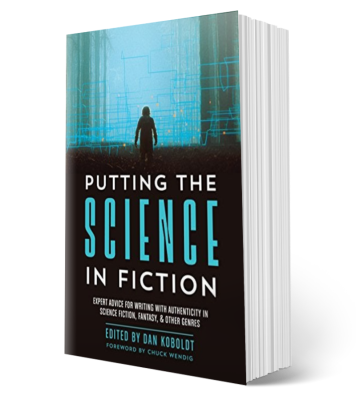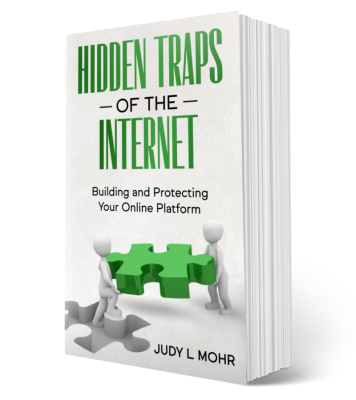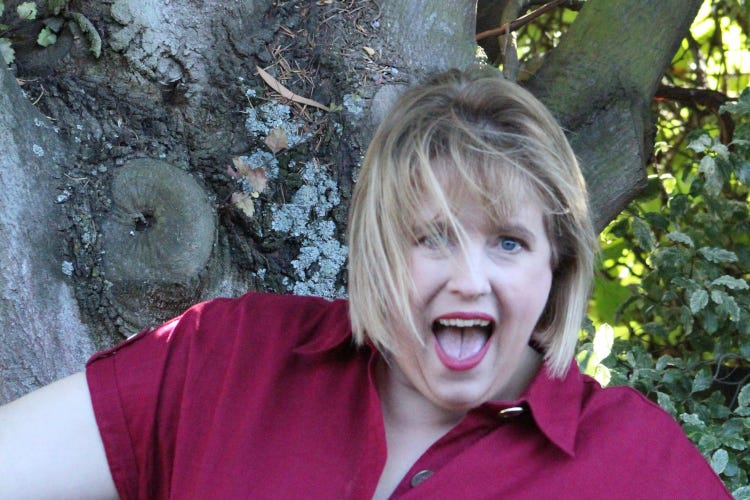Meet Author & Editor Judy L. Mohr
She talks about science in fiction, hanging the lantern, and what she believes is the biggest danger on the internet. (It may not be what you think.)
Please welcome award-winning, multi-genre author Judy L. Mohr today. She writes techno-thrillers, fantasy, science fiction, and non-fiction. Her short bio “Kiwi Judy L Mohr is a writer, book doctor, and science nerd. Check out her crazy adventures on Instagram (@JudyLMohr).” I learned a lot from interviewing her, and I included some of my mental reactions throughout this Q&A. And if you’re interested in self-publishing, she has some advice for you, too.
Tell us a little about your work, which spans multiple genres: non-fiction, techno-thrillers, fantasy, and science fiction.
My writing has always leaned into fantasy, sci-fi, and technology. Sometimes, we wished that magic could exist, or that science has advanced to the point where cancer is easily cured. But even if science and magic could solve our current global problems, the human condition is still something we don’t fully understand. If we did, programmers would be able to easily program ethics and emotions into artificial intelligence programs.
I use my writing to help me process the world around me, to make sense of the chaos. To understand why I feel the way I do. This pursuit of knowledge and inner truth bleeds into everything that I write, from my nonfiction about technological advancements, through to an exploration of human nature within my fiction.
Where do you get your inspiration for your techno-thrillers?
I have always been a fan of action stories. And when you start to add a speculative nature into those stories, there is no limit on where the story can go. My favorite stories growing up were things like Fifth Element, Bladerunner, and Total Recall. And I adore the innocence found in Princess Bride and Dark Crystal. When my kid’s were younger, I could quote the nonsensical words of Dr. Suess.
If you look at the roots of those stories, it’s the absurdity of the situation that comes to the foreground. That’s what I enjoy about techno-thrillers and fantasy stories. You know it’s not real, but because it’s not real, the imagination can go wild.
I see a news article, and… “Oh, this can go so badly.” And I start writing.
I have a random conversation with someone, and the absurd situation plays out in my head.
The cat stares at me, like he does, and I just know what his thinking. And the next thing I know, I’m having a complete conversation with myself on how the cat is telling me off for not feeding him the food he wants to eat.
Inspiration is everywhere.
What kind of research did you do for your novels?
It depends on the novel and what the story needs. My focus is always on the story first. I strongly believe that a reader starts reading a story because of the plot (and the premise), but they keep reading because of the characters. So, that is where I put my emphasis: the characters and their journey.
When drafting, I’ll make notes about the research I need (or the details that I’m missing), and that forms the basis for my research. And the nature of the information needed will define how I go about my research. Sometimes, it’ll be phone-a-friend. Sometimes, it’s dive into scientific papers. Sometimes, it’s Google foo. But I’m only after the plausibility factor. The moment I have the detail that will make things plausible, I’m onto the next research topic.
You’re a Kiwi, yet you set your thrillers in America. I imagine that has some challenges. What difficulties have you faced in this regard?
And as a followup, why set the books in America, in Atlanta in particular? (I’m originally from Atlanta, so that caught my attention!)
While I originally set my contemporary stories in the US, this is changing.
My crime thriller (the one that was set in Atlanta, Georgia) will be moving to Sydney, Australia. I had originally set it in Atlanta, because at the time I was writing it (back in 2017), the market wasn’t all that interested in stories set outside the US. I chose Atlanta for two reasons: 1) I had contacts who knew the city, and 2) the police department had a full set of documents about their internal workings available on the internet.
BUT we are now 7 years later, and the world has gone topsy-turvy. For a variety of reasons, I’ve elected to move my crime thriller series to a setting closer to home. Sydney, Australia provides the perfect playground for that series.
When drafting new stories, I chose settings based on what works best for the story. As most of the stories that I’m writing these days are dystopian, I can lean into any part of the world and make the setting plausible.

You hold a PhD in astronomy and worked as an engineer. You’ve also contributed to an anthology about getting the science right in fiction of all types. (Putting the Science in Fiction: Expert Advice for Writing with Authenticity in Science Fiction, Fantasy, and other Genres, edited by Dan Koboldt) What is your biggest pet peeve, the thing that authors consistently get wrong, about science, whether that be astronomy or engineering?
I’m okay with writers getting the science wrong.
(Meredith reaction: Whew! That’s a relief!)
I’m not okay with writers not taking the time or effort in their world-building (and research) to explain why something is outside the expected norm. That goes for ALL details, including historical fact, societal norms, and the science.
We have become a society that just accepts what we have been told without questioning it. So many writers have a bad habit of just believing what is on TV or in film, but Hollywood has been known to get the details wrong. For example, defibrillation is not something that is done in the field on a “flatlined” patient. It’s something that is done when the heart is in fibrillation (hence the name). And the body doesn’t “jump” like you see on the TV screen. Yet, the number of people who believe that’s how it is—just because it’s been like that for years on TV and film—is astonishing.
(Meredith reaction: I had no idea it didn’t happen like that!)
As a writer, you have to make a choice: go with TV and film and get it wrong, or get it right and highlight that TV and film have it wrong.
The technique is known as hanging a lantern on it, and I use it a lot! It comes in handy within fantasy and science fiction.
You’ve decided to go all-in with self-publishing. What advice would you have for those writers considering this path to publication?
Do your research and don’t make this decision lightly. And DON’T RUSH THE PROCESS! It’s a lot of hard work to produce a quality product.
A lot of writers are in a rush to see their work out in the wild, so they will either skip steps or jump into something without fully understanding what is needed. Many writers go from drafting and editing straight to publishing… and things like copyright, ISBNs, branding, cover treatments, marketing, etc. is an afterthought. And that’s when writers get stung.
Take the time to learn the process. It doesn’t matter if that means that you’ll have to hold off on releasing your book for another year. That extra year will be time well spent.
You also run Black Wolf Editorial Services. What advice do you have for writers who are considering whether or not to hire a professional editor?
I think most writers understand than a professional editor is worth it when it comes to the final book. However, the cost is often a deterrent, making many writers scared to take that step—particularly if this is the writer’s first book. I get it. I understand. But hiring a professional editor is an investment in your career, not just the one book.
A good editor will highlight issues with your writing and propose ways to correct it. Developmental editors (which is what I am) will help you understand why your novel isn’t pacing all that well or why the characters are not believable. And they’ll give you solid advice how possible plot treatments can be used to improve any structural issues and pacing problems. Copyeditors might see favored sentence constructions, and they’ll suggest how to change it up to improve the musicality of your narrative. And a good copyeditor will also point out inconsistencies found in your writing.
Normally, in those editorial reports, there will be some nugget of information that you can applied to everything that you write, advancing your skills and making you a better writer.
Your nonfiction book, Hidden Traps of the Internet: Building and Protecting Your Platform, speaks about internet safety as authors build their online platforms. In your opinion, what’s the biggest online safety challenge for authors (or people in general!) today?
As you can imagine, I have a lot of opinions about this area, but the biggest danger on the internet is ourselves.
It comes back to our willingness to just accept things without questioning it. Because of it, we are willing to trust blindly… So, we don’t think about the details in the background of that photo that we share on Instagram. Or we don’t consider how one sentence (taken out of context) could be misinterpreted. Or we see what might be a good deal and we blindly click the link (and the hacker is in your systems).
It’s our practices and our attitudes that is the biggest danger when online. My advice: Keep your wits about you, and make sure that you check every detail of that post before you hit the send button. Is there anything in that post (be it in the image or in the phrase of the caption/words) that could come back and bite you in the ass later? But even if you inadvertently post something that wasn’t the smartest idea (like the photo of your new car showing your license plate number), you can delete and scrub the post. Unfortunately, that photo will still be floating around the internet, but with any luck, the bad actors on the internet won’t have seen it.
I talk about this, along with so many other things, in my book Hidden Traps of the Internet: Building and Protecting Your Online Platform (link: https://judylmohr.com/books/hidden-traps/ )

Out of curiosity, do you have any loose connections to unsolved mysteries or crimes?
Not that I’m aware of. But wouldn’t that be cool!
Also out of curiosity, do you know of any true crime or ghost-story-type legends from your hometown? Or the weirdest or most notorious crime?
Within Christchurch, New Zealand… nothing comes to mind. BUT notorious crime in New Zealand… Just search up Minnie Dean. She’s the only woman in New Zealand history to have been executed for her crimes, found guilty of serial infant murder. Other women have been sentenced to death, but they have all had their sentences commuted to either life or long-duration imprisonment.
(Meredith reaction: Hmm, I sense another dive into the archives is in my future.)
Where can readers find you online?
I’m happy to chat with anyone about writing, editing, writer online platforms, and the coo-coo of writing world. I share tidbits of my writing and my journey into publishing (including the release of my upcoming novel) via my personal blog at judylmohr.com, and subscribers to my author newsletter are treated to one of my short stories. I share writing and editing advice on The Black Wolf Editor’s Blog (found at: blackwolfeditorial.com/blog/). But for those wanting to reach out to me via social media, you can find me on Facebook (@JudyLMohr) and on Instagram (@JudyLMohr).
Thank you for this opportunity to give a little insight into how my brain works.
Thank you, Judy, for coming to the blog today and sharing your insights. I learned a lot and I hope my readers did, too.
Here’s a quick update on my own writing.
Last month, I searched for someone to read parts of my manuscript where my American protagonist and several Mexican immigrant characters intermingled Spanish and English in their dialogue. Through Sisters in Crime, I found José H. Bográn, a bilingual editor, who read and corrected my many, many mistakes. (Among other things, I learned that when cursing, the word for devil is pluralized, Diablos.) I heartily recommend José!
Now I’m prepping my manuscript and gearing up to query agents again. I’m also at work on a sequel to The Death of an Angel. No title—I’m horrible with titles, but most authors seem to say that, don’t they?—but it involves the murder of a sweet elderly lady, the widow of a not-so-sweet disgraced pastor, and my journalist-protagonist’s investigation stirs up past hurts and controversies in her own church congregation.




Hi Judy and Meredith. This was a fantastic interview. Even though I'm a mystery/suspense/thriller author, my first love is writing fantasy too. Judy and I could geek out together over the LOVE of unleash creativity in world-building and research. (I think it's fun, no kidding) to research unusual cultures, laws, sports, weapons, societies, flora, fauna, and coming up with religions specific to my world etc and twisting them so they're only slightly recognizable.
I whole heartedly agree about needing editors--but I'd caution everyone to research there as well.
Several years ago, I had hired a copyeditor who wasn't worth the hundreds of dollars I paid her. I picked out mistakes she added to my manuscript and missed ones I did myself. There's nothing you can do about a crappy edit when you hire a freelancer.
Beware of the copyeditors posted on Reedsy, too. DO YOUR research there as well. Just because they claim to be an editor doesn't mean they have the skills to do specific types of editing--like copyediting. I recently researched 75 editors on Reedsy who did my genre. After a weeks' worth of research, I was stunned that only two of the ones I narrowed my choices down to had formal copyediting education. The ones who did were from the UK. I debated about that, but decided if there were problems with payments or the job had not been completed, it would be harder to deal with overseas and I'd heard nightmare stories about trying to get money back through Reedsy, so I kept searching.
Judy, if I had known about your editing services a week ago, I would have definitely looked you up. I LOVE developmental editors. I joined the journey, Judy. I have no doubt I'll enjoy the story.
Thanks so much for taking the time to do this fantastic interview with Meredith. (Who as always is a fun and professional lady to work with.)
Terrific interview! And I wholeheartedly agree that the biggest danger on the internet is ourselves.